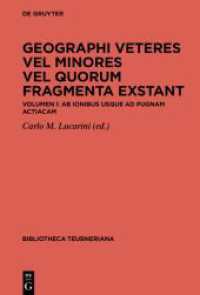- ホーム
- > 洋書
- > ドイツ書
- > Mathematics, Sciences & Technology
- > Biology
- > basics
Full Description
Bioconversion of waste is a natural process aiding in the recovery of resources and biotechnology-facilitated natural recycling processes. Biotechnological treatments to food processing wastes found in large quantities can produce useful end products, such as microbial biomass protein, while wastes are also purified during the process.








